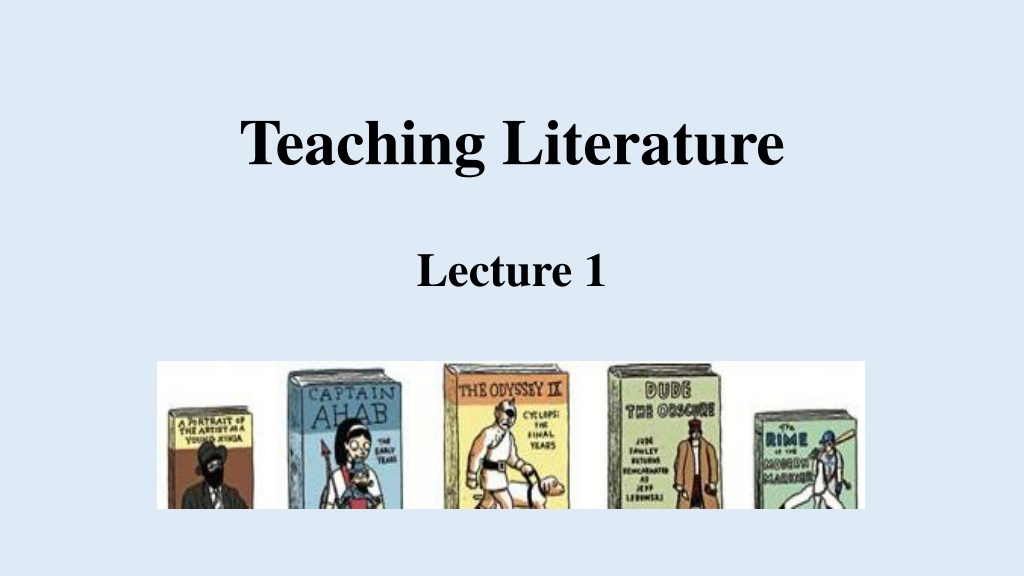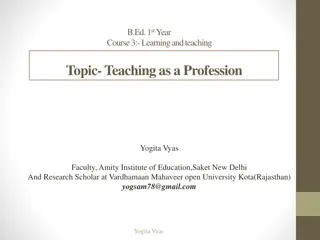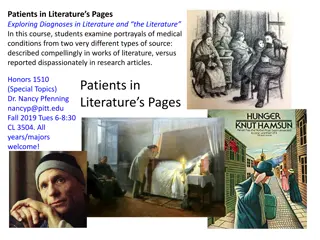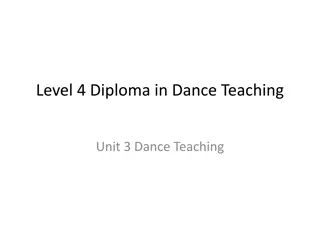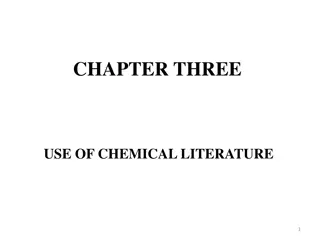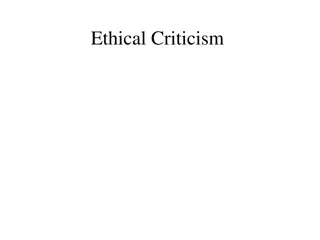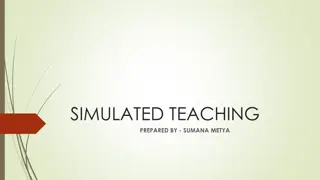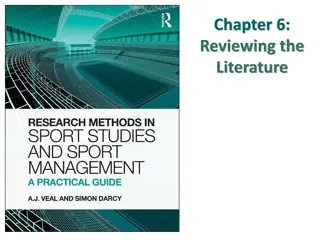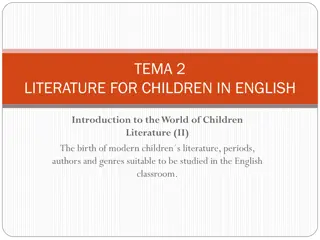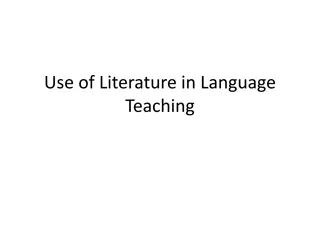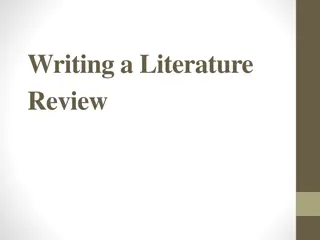Challenges in Teaching Literature for TEFL
Teaching literature in Teaching English as a Foreign Language (TEFL) faces challenges in determining its purpose, content, and effective methodologies. The importance of reading skills and strategies is highlighted, emphasizing the need to develop better approaches to engage learners with literary texts.
Download Presentation

Please find below an Image/Link to download the presentation.
The content on the website is provided AS IS for your information and personal use only. It may not be sold, licensed, or shared on other websites without obtaining consent from the author. Download presentation by click this link. If you encounter any issues during the download, it is possible that the publisher has removed the file from their server.
E N D
Presentation Transcript
Teaching Literature Lecture 1
1. Introduction In the context of Teaching English as a Foreign Language (TEFL), teaching literature has always been controversial and questionable. For most reasons, the problem seems to persist partly in whether literature should be taught for teaching linguistic and communicative competence or as an end per se, and partly in the wide gap between the substantial contents of literature syllabi, because of the nature of the subject, and the methods and techniques to be used to carry these programmmes out.
1. Introduction(contd.) Brandes (1986, p. 12) claims that: Learning what is meaningful and relevant depends partly on what is taught and partly on how it is taught.
1. Introduction (contd.) With the emphasis on what Brandes considers, we believe that if teaching literature fails to achieve its goals, it is not merely the fault either of literature as a subject or the weaknesses of the learners, but rather of approaches, methods and strategies used by teachers and educators to handle the huge bulk of literature. Thus, developing methodologies for teaching literature comes to be a very urgent recommendation on the part of both researchers and teachers to make the process more effective and consistent.
1. Introduction (contd.) Since literature is a reading-centered task, teaching literature cannot work without considering highly the skill of reading. Efficient literary reading however remains a hindrance in the way of teachers and learners because of the absence of consistent techniques and strategies that could facilitate the task.
1. Introduction (contd.) Miliani (2003, p. 46) argues that: One should not forget that if we are to establish relationships with literature, it is through reading. Unfortunately, this skill has been and is still given rough handling by the educational system, society at large and the learner himself.
1. Introduction (contd.) Thus, developing methods and pedagogies to integrate efficient reading skills and strategies in literature course seems to be a very urgent requirement. Therefore, reading remains the only means and the most efficient skill to enhance the students capacities in coping with the bulk of literature.
2. Pedagogical Implications for Teaching Literature The inclusion of literature in any course depends partly on the nature of the syllabus and partly on the objectives set for the course. In the context of Teaching English as a Foreign Language (TEFL), teachers and educators have always been inquiring about the utility of literature in language learning. The inclusion of literature course in teaching foreign languages dates back to the days when the grammar translation method was dominant and literary texts were a main source for foreign language teaching.
2. Pedagogical Implications for Teaching Literature (contd.) With considered for the great body of vocabulary, structures and texts of all types and genres it provides. In the 1970 s and 1980 s, the communicative language teaching approach ignored the role of literature and questioned its contributions to the classroom. Yet, in the last fifteen reconsidered within the language teaching classes. the structural approach, literature was highly years, literature has been
2. Pedagogical Implications for Teaching Literature (contd.) Widdowson, Slater, Mackay, Carter, Long, Brooks, Lazer, Harmer and Hedge are among the most dedicated supporters to the return of literature in the language classroom. Widdowson (1984, p. 162) asserts that: Literature, and poetry in particular, has a way of exploiting resources in a language which has not been codified as correct usage...It has no place in an approach to teaching that insists on the gradual accumulation of correct linguistic forms.
2. Pedagogical Implications for Teaching Literature (contd.) Widdowson has questioned the role of literature in the structuralist approach which emphasized correctness in grammatical forms and restricted lexis, the thing which did not allow the various uses of language. Widdowson also argues that grammar translation method and the structuralist approach, by definition were incompatible with the teaching of literature, though they exploited and used its bulk.
2. Pedagogical Implications for Teaching Literature (contd.) With respect to these views, applied linguists, especially those who belong to the Communicative Language Teaching Approach called for a return of literature in the language classroom, yet, with a different pedagogical approach for non-native students of English. Long (1986, p. 42) points out that: The teaching of literature is an arid business unless there is a response, and even negative responses can create an interesting classroom situation.
2. Pedagogical Implications for Teaching Literature (contd.) Clearly, Long is pointing at a reader response approach which stresses the value of individual and unique response to text and frees the reader from stereotyped and conventional responses often provided by teachers. Rosenblatt (1985, p. 40) pinpoints the idea as follow: The reading of any work of literature is, of necessity, an individual and unique occurrence involving the mind and emotions of some particular reader and a particular text at a particular time under particular circumstances.
2. Pedagogical Implications for Teaching Literature (contd.) Within reader-response approach, reader and text mutually affect one another as labelled by Rosenblatt (1985, p. 40) a transaction with the literary text. She also maintains that transaction is an aesthetic reading through which the reader engages with ideas in the reading text relying on his/her prior experiences. From this transaction the reader creates a new unique and personnel experience.
2. Pedagogical Implications for Teaching Literature (contd.) The students therefore should be encouraged to express themselves freely about a literary text and slightly assisted to appreciate a literary text since literature encompasses artistic, social and cultural elements that are detected and approached in several different ways by different readers. Accordingly, reading instruction should not seek to control the reader s experience but to facilitate the reader s own structuring of that experience. Hence, the teacher would assume a role of an enabler for the transmission of knowledge.
2. Pedagogical Implications for Teaching Literature (contd.) This implies motivating students by selecting appealing works to which they can linguistically in order to render reading a literary text an enjoyable and responsive experience. Moreover, the reader-response approach stresses the necessity and the pedagogical value of developing the students critical abilities and awareness, so that they would become critical readers and not passive accumulators of what has been delivered to them in class by their teachers. respond emotionally and
2. Pedagogical Implications for Teaching Literature (contd.) On the whole, according to the proponents of reader-response approach, Rosenblatt (1985), Long and Carter (1991); and learner-centred approach, Tudor (1996), a good pedagogic approach to teaching literature should aim at eliciting the students response to the text and guiding them to a personal discovery, thus bringing in them the continuous love, enjoyment and appreciation of literary texts. This would eventually develop the students both language and literary competence.
3. Teaching Literary Text Approaches The traditional approach Language-based approach Reader-response approach
3.1 The traditional approach It is conceived that because of the special features of academic content of literature and also because of the traditional methods of teaching literature, the role of the teacher in literature course is basically that of instructor and transmitter. Regarding this view, the teaching of literature in our universities has become mainly lecture-based with teacher- centred approach.
3.1 The traditional approach (contd.) As a consequence, the student becomes a parrot-like capable of simply repeating and vomiting what has been presented in class. Mililani (2003, p. 2) states that: Thus, the course (of literature) transposition of the teacher s impressions and feelings to the learner towards a literary work, and not an intellectual exercise for the latter who should seek and discover meaning by himself with the means and strategies provided by the teacher. becomes a simple
3.1 The traditional approach (contd.) Actually, in most literature courses, the teacher first assigns a text for students to read generally before class. Then, in the classroom, the teacher s attention will be centered on the background information and explanations about some thematic and stylistic features of the text. In this teacher-centered approach, the learners have only few opportunities to do the task by themselves and formulate their own feelings and responses about the reading text.
3.1 The traditional approach (contd.) Generally speaking, this approach does not consider too much the learner. Learners, thus read large amount of literary works, but whether their capabilities of assimilating, appreciating and analyzing is actually questionable.
3.2 Language-based approach With the attention of looking for a more effective approach to teaching literature to EFL students that would help learners interact profoundly with literary reconsider the teacher s role, a language-based approach seems to be a very appropriate alternative that most of contemporary applied linguists and educators are calling for. texts and
3.2 Language-based approach (contd.) Miliani (2003, p. 2) affirms that: Literature rarely seems as an opportunity for language use, hence the need for a language-based approach to the teaching of literary texts in order to develop knowledge OF literature notABOUT literature.
3.2 Language-based approach (contd.) Arab (1993, p. 135) also affirms that: This is why the language-based approach, which not only softens the sudden exposure to marked texts, but also extends the students word repertory, as well as reading and writing skill, seem to be the most appropriate.
3.2 Language-based approach (contd.) The language-based approach entails the use of detailed analysis of text to guide students towards meaningful as well as personal interpretation. The teacher thus has knowledge to form aesthetic judgments about the reading text. Besides, the reading texts should not be selected only for their stylistic features, but also for the fact that they reflect the learners interests in order to foster their engagement and allow them practise their personal experiences in their interpretation, typically as native speakers do when reading their preferable works.
3.3 Reader-response approach With respect to the language-based approach, the teacher should not consider the learners as passive recipients, but active participants in extracting meaning from text and then responding to the underlying messages. Each reader will contribute to the final outcome depending on their expectations and previous experience. The teacher s role thus will be that of a mediator to help learners interact with the text.
3.3 Reader-response approach (contd.) As McRae (1991:97) supposes: The teacher s role is as intermediary between author, literary work, and receiver in order to open up a multi-directional sphere of interaction. Therefore, the teacher must shift from teacher-centred to a learner-centred pedagogy that would allow him to assume a role of facilitator and mediator, in order to lead his learners towards an independent ability to read, assimilate and appreciate literary texts.
4. Literary Competence Most of English language and literature teachers are familiar with Chomsky s term grammatical competence which refers to native speakers mastery of internalized knowledge of rules and norms which govern their language and make them generating and understanding meaningful utterances. Yet, few of them are not aware of literary competence.
4. Literary Competence (contd.) Lazer (2000, p. 12) argues that: Effective readers of a literary text possess literary competence , in that they have an Implicit understanding of, and familiarity with, Certain conventions which allow them to take the words on page of a play or other literary work and convert them into literary meaning.
4. Literary Competence (contd.) Literary competence thus refers to an analogous mastery and knowledge of the roles and norms of literary discourse. This implies how a literary work, as distinguished from non-literary, is to be read processed and comprehended. Within literary reading, the reader is very often confronted with a language that uses metaphorical and symbolic meanings which include figures of speech, metaphors, simile, etc.
4. Literary Competence (contd.) Teachers of literature thus have to familiarize their students with such language use and should encourage them to process any marked deviations from ordinary grammar and language. Moreover, readers should acquire a kind of competence to enable them recognize literary genres since each genre will require some specific knowledge on the part of the readers. Thus, reading a poem would activate the reader s schemata- knowledge-on rhyme, meter, rhythm, alliteration and images while reading a novel would imply readers to concentrate more on plot, characters, point of view, tone and so forth.
4. Literary Competence (contd.) Each literary genre, actually disposes a particular set of features which makes it read and handled in a particular way with particular skills and activities. Besides, reading a literary text poses a crucial problem at literary terminology level or metalanguage. Readers then have to be acquainted with the necessary key literary terms to enable them exploring a literary text appropriately.
4. Literary Competence (contd.) For foreshadowing, irony, apostrophe, etc., they will just rely on literal meanings of words, expressions and sentences that make-up the text. Literary competence is dependent on the reader s awareness of literary text s devices, techniques and terms used by writers. This implies deviations of literary language, the use of metaphorical language, and the specificities of literary genres, since each genre presents a particular type of reading and knowledge, and literary terminology which helps the reader add meanings that are not apparent through the literal reading of language items. instance, if readers do not know foregrounding,
4. Literary Competence (contd.) On the whole, the more a reader is aware of the literary style, devices, techniques, genres and terms, the more literary competent he will be. So, teachers of literature have to consider the importance of literary competence through incorporating some tasks and activities in literary course.
